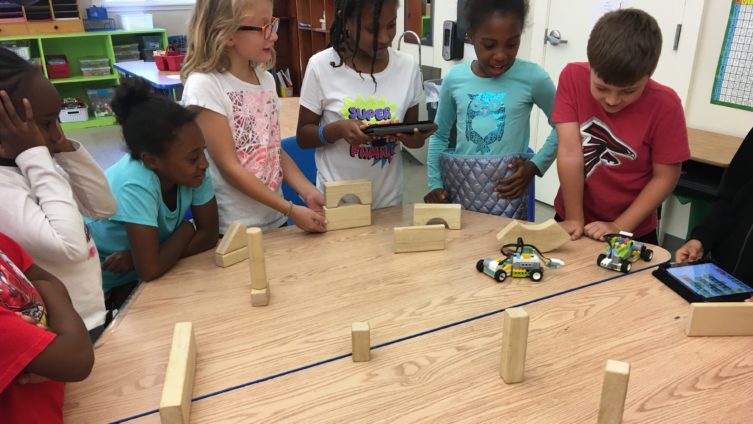
TCS announced in November that we are the proud recipient of a $450,000 grant from the Goizueta Foundation for STEAM initiatives and financial aid. STEAM is an acronym for Science, Technology, Engineering, Art, and Math, and is a nationwide movement designed to give students more exposure to these areas in an integrated, design-focused way.
STEAM is an expansion of STEM articulated by John Maeda, former President of the Rhode Island School of Design who believed that the STEM structure didn’t give enough emphasis on the importance of the creative process and aesthetics in science and design. Thus the “A” for “Arts” was added to STEM to form STEAM, which, with the underscoring of the importance of creativity, was a natural fit for TCS.
This STEAM initiative fits The Children’s School’s long history of hands-on education and the integration of content. The opportunity to be more systematic and intentional about the interconnections between science, math, technology, and engineering, and to extend the role of the arts more deeply into the broader curriculum will enhance our ability to meet our commitment to laying the critical early groundwork for developing thoughtful, creative young adults who are ready to impact the broader world around them.
The grant funds five areas, which will be implemented over the next three years. These areas are:
- Maker and Tinker carts that include Zoobs, Kinex, and other exploratory building materials distributed around campus
- Photography and imaging equipment for the digital visual arts like cameras, lighting kits, and digital processing technology; robotics and drone equipment; fabrication equipment like dye cutters, sewing machines, fabric pattern cutters
- Science exploratory tools like digital imaging microscopes,field science tools, and sensor probes to explore physics, chemistry, water testing, and environmental studies
- Drone hardware, kits, safety equipment, and supplies
- Coding and robotics workshop equipment like Raspberry Pi, Makey Makey, Little Bits, and other programming and coding resources
We are already underway with a number of these items. The Middle Grades began using the water-testing tools for water quality testing in Piedmont Park as part of their recent immersive project-based learning (I-PBL) unit on food and water access, and has began using some of the photographic gear as part of their current unit on sustainability and journalistic reporting. The lower grades have been working with Little Bits, an award-winning design and coding platform that allows children to create electronic robots and other movable gadgets and to program their movement.
Moving forward into next year, you will see the Maker and Tinker carts distributed around campus, an increase in robotics and coding opportunities across the grades, and the addition of field science and data gathering as part of our outdoor education experience. Over the next three years, we are excited for the increased opportunities for our students in STEAM!









